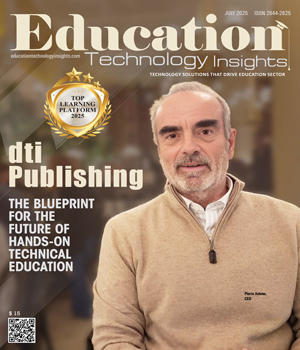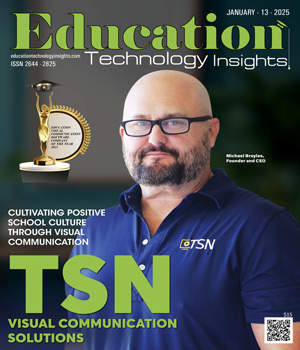THANK YOU FOR SUBSCRIBING
Be first to read the latest tech news, Industry Leader's Insights, and CIO interviews of medium and large enterprises exclusively from Education Technology Insights
Emphasizing Career-Focused Education
Michael Carr, Director of Education, Lincoln Tech
 Michael Carr, Director of Education, Lincoln Tech
Michael Carr, Director of Education, Lincoln TechWith more than four million hands-on jobs projected to open nationwide in the next ten years, investing in a skilled trade education now can pay great dividends in the near future. Those positions are projected to be available in industries like automotive and dieselservice, collision repair and refinishing, computerized manufacturing, healthcare support, and skilled trades, including welding, HVAC, and electrical – and Lincoln Tech's East Windsor, CT campus helps students prepare for careers in each of these fields.
“When it comes to career-focused education, the future is now,” says Michael Carr, Lincoln Tech’s director of education at the East Windsor campus. “As we’ve moved past the pandemic, companies are hiring again. Schools like Lincoln Tech are helping those companies bridge the skills gap by training and graduating skilled technicians to meet their growing needs.”
The skills gap Carr speaks of has impacted dozens of the nation’s most critical industries: fields where hands-on abilities and technical expertise combine with communication skills and an eye for detail. Simply put, there aren’t enough candidates in today’s workforce with that profile to fill all of the jobs that are available. Lincoln Tech is leading the way in providing an ongoing supply of technicians and helping connect them with employers who need their skill sets.
Many of the region’s best-known employers partner with Lincoln Tech to meet, interview and often hire graduates right out of school. Tesla, Stellantis (the parent company of Chrysler, Jeep, and more), and Penske offer partnership training programs that offer more direct paths to careers in those organizations. Penske and Republic Services – top names in the diesel industry – maintain close relationships with the campus’ career services team. Companies like Johnson Controls International and Hussmann offer opportunities for graduates of the electrical and HVAC programs to train at other Lincoln campuses across the country for advanced skills and new job opportunities, often at no cost to the students.
More than 800 students are usually enrolled at any given time at Lincoln Tech in East Windsor, which boasts 350,000 square feet of training space on a 40-acre campus right off of I-91. It’s the only Lincoln Tech location to offer such a broad range of career training options, and according to Carr, 82 percent of graduates get hired for their fields after graduation.
"Much of today’s career training, Carr explains, is driven by advanced technology within the classroom that mirrors today’s technologically sophisticated workplaces."
“Our faculty is filled with expert instructors who bring years of real-world experience to our classrooms, labs, and training bays," Carr says. "They're helping our students develop not only hands-on technical skills but also customer-facing skills that graduates are going to need if they want to be successful. Our school has been a cornerstone of the New England education community for decades, and hiring managers know the quality that a Lincoln Tech credential represents. Many companies regularly send representatives to the campus for hiring fairs, to meet students approaching graduation, and to discuss their hiring needs with our career services team. So in many cases, graduates have a number of potential job opportunities before they’ve completed their training.”
While the campus marked 30 years in East Windsor this summer, Lincoln Tech schools have had a nationwide presence for more than 75 years. With that history comes a reputation at every campus for delivering training programs that prepare graduates through an effective combination of industry-approved curricula, hands-on practice with the same kinds of equipment used by professionals, and time-logged working in real-world facilities such as auto and diesel bays, simulated homes for the HVAC and electrical programs, and working healthcare labs for future Medical Assistants.
Much of today’s career training, Carr explains, is driven by advanced technology within the classroom that mirrors today’s technologically sophisticated workplaces.
“Technology helps us simulate what students will encounter when they get out on the job in their new careers,” he says. “For example, our Welding and Collision Repair and Refinishing Technology programs feature simulated welding and spray booths where students practice ‘handling’ welding torches and spray guns and learn to use them safely before picking up the real thing. They’ve got a feel for the technique before they move up to working with the real equipment.”
Another area where technology plays a key role in training is the Medical Assistant program. Here, Carr says, students practice their skills on computerized manikin simulators that can be programmed with symptoms and respond like real patients.
Lincoln Tech also builds its programs around the convenience and mobility that students may be looking for in a post-pandemic world. “We’re sensitive to the fact that many students – as many as 70 percent - are holding down other jobs while they train at our campus," Carr says. "We offer a variety of schedules, and many programs include Blended Learning platforms so students can complete some of the work online, from home, and on their own schedule. Each student has access to a personalized portal – Career Edge – where they can practice soft skills exercises related to things like time management.”
At the campus, students can focus their time on learning the hands-on skills that will be at the core of their new careers.
Weekly Brief
Read Also
Our AI Crisis isn't Technical. It's Human.
4 Keys to Managing Change
Active Engagement is the Foundation of Effective Leadership
Empowering Leadership through Innovation in Higher Education
Redefining Readiness: A Path Toward a Technology-Agnostic Future
The New Era of Education

I agree We use cookies on this website to enhance your user experience. By clicking any link on this page you are giving your consent for us to set cookies. More info

























